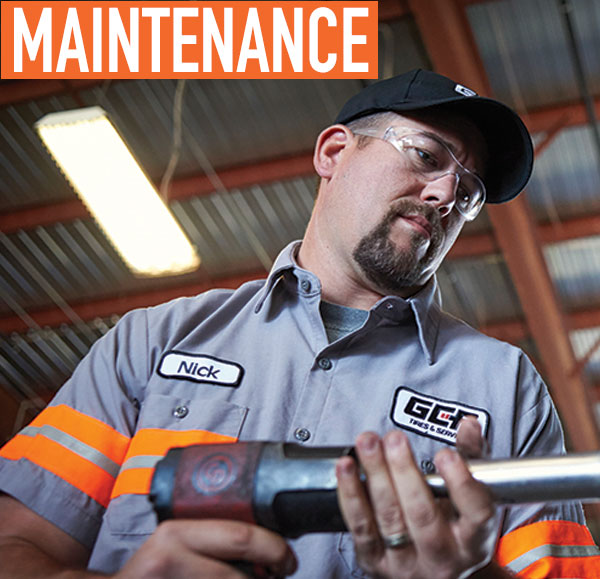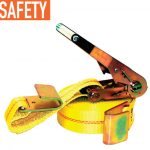GCR Tires and Service (GCR) has stood for quality and service in the commercial tire business since 1945. Putting safety at the core of everything it touches, GCR’s focus is on timely solutions and long-lasting customer relationships. With more than 70 years of acquired knowledge, GCR shares some insight to the importance of tire maintenance.
What are some ways fleets can maximize uptime and better manage their tire assets?
Proactively managing tire assets helps maximize their performance and long-term value. In particular, tires that are well cared for not only help keep a fleet up and running, they also result in better, more useful tire casings that can be retreaded multiple times, which can significantly reduce one of the largest operating costs for fleets.
GCR Tires and Service recommends that fleets work with a trusted service provider to help make decisions regarding their tire needs. Tire service professionals should conduct regular tire inspections at every wheel position to increase productivity and uncover any potential issues before they cause costly downtime. GCR technicians work closely with fleet managers to develop a proactive tire management program tailored to their business goals.
Of course, inspection and preventive maintenance is key, but even the best tire in the wrong application will not deliver the intended results. When selecting a tire for a vehicle, fleet managers should consider the vehicle type, the Gross Axle Weight Ratings (GAWRs), speed requirements, service conditions, and tire specifications such as size, load range, and intended application. By selecting the right tire for the application, fleets can optimize tire and vehicle performance and positively impact their bottom line.
What does a scheduled, proactive tire maintenance program look like, and why is it so important?
A scheduled, proactive tire maintenance program is one of the most important things fleet managers can do for their operation. Implementing a steady routine of proactive tire service and inspection prevents unplanned downtime, promotes safety, and maximizes the value and efficiency of the fleet’s assets. Fleet operators should do the following before each haul, no matter the distance, to avoid unplanned downtime and help make sure casings remain suitable for retreading:
Check and set proper inflation pressure for every tire. Use a tire pressure gauge.
Inspect tires for damage such as cuts, cracks, bulges, and penetrations.
Closely monitor tread depth. Check for uneven wear, which could be a sign of underlying damage. If a tire is excessively worn, not only is it an out-of-service condition, it could cause the casing to be ineligible for retread.
What role does tire inflation play in overall tire performance? Can it impact the lifecycle of a tire?
Inflation pressure has a significant impact on tire safety, functionality, fuel efficiency, and service life. Proper inflation pressure is necessary for the tire to carry the load and perform as intended. It also promotes even pressure distribution across the tread, which reduces the potential for irregular or rapid wear. For instance, 10 percent underinflation can shorten tread life between 9 and 16 percent. Underinflation by 10 psi can cost fleets about 0.5 percent in miles per gallon in overall fuel efficiency, directly affecting a fleet’s bottom line. Underinflation also generates excessive heat and strain on the tire components which not only reduces the potential for the casing to be retreaded, but could also result in unplanned downtime.
GCR recommends fleets check and set tire pressure during pre-trip inspections by using a reliable gauge at each wheel position to ensure it is accurately measured.
What impact does choosing the wrong tire for a specific wheel position have on a fleet?
Choosing the wrong tire can decrease effectiveness and efficiency—not a desired outcome considering the investment fleets make to stay on the road. Factors such as tire size, load range, speed capability, inflation pressure, and application/service conditions should all be considered when choosing the right tire. After the tire is chosen, proactive maintenance is critical to achieve maximum performance.
Is there anything fleets can do when evaluating tire performance to improve fuel economy?
Choosing fuel-efficient tires across all positions can improve fuel economy. Many fleets only select fuel-efficient tires for the steer position, but trailer tires account for more than 40 percent of a vehicle’s rolling resistance. By incorporating fuel-efficient tires, such as the Bridgestone Ecopia tire line, at different wheel positions, fleets can dramatically impact the bottom line.
Retreads are also an excellent tool for improving fuel efficiency. When fuel-efficient casings and tread are used together, retreads offer fuel efficiency benefits that meet or exceed many new tires. Retreads are a smart choice for fleet owners looking to maximize tire assets and lower total cost of ownership over time.
However, no matter what tires fleets are using or considering, proper inflation pressure maintenance is vital to achieving their fuel efficiency potential. Such maintenance has the added benefit of maximizing safety, uptime, and tire retreadability.
Is there anything fleet owners should know about GCR and its differentiation from other service providers?
Tires are one of a fleet’s biggest investments, which is why we stress the importance of working with a trusted service provider to ensure a fleet is maximizing the performance and value of their tires. GCR Tires and Service is one of the largest networks of commercial tire and service stores in North America. With more than 150 store locations and 1,500 service vehicles, this extensive network allows GCR to meet customers’ needs.
ABOUT THE AUTHOR
Ron Greenleaf is a regional sales manager for GCR Tires and Service overseeing sales and service operations for the Mountain and Desert region. He has worked with Bridgestone for more than 20 years, serving in various sales and marketing capacities including regional manager, strategic account manager, and national account manager.Find out more about GCR, visit www.gcrtires.com.
_______________________________________________________________________
MODERN WORKTRUCK SOLUTIONS: FEBRUARY 2018 ISSUE
Did you enjoy this article?
Subscribe to the FREE Digital Edition of Modern WorkTruck Solutions magazine.
![]()




